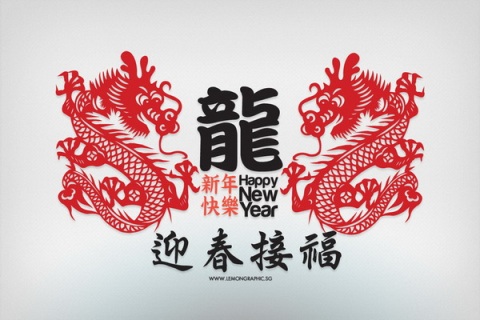The Year of the Dragon will begin on January 23, about 74 hours from now. The Dragon is the fifth sign of the Chinese Zodiac, which consists of 12 Animal signs. The Dragon is a creature of myth and legend and is the ultimate auspicious symbol signifying success and happiness.
Chinese New Year is the longest and the most important Chinese festival. It is also known as “Spring Festival,” the literal translation of the Chinese name 春節 (Pinyin: Chūn Jié), since the spring season in Chinese calendar starts with lichun, the first solar term in a Chinese calendar year. It marks the end of the winter season, analogous to the Western carnival. The festival begins on the first day of the first month in the traditional Chinese calendar and ends with Lantern Festival which is on the 15th day.
Chinese New Year’s Eve, a day where Chinese families gather for their annual reunion dinner, is known as Chú Xī (除夕) or “Eve of the Passing Year.” Because the Chinese calendar is lunisolar, the Chinese New Year is often referred to as the “Lunar New Year”.
In preparation for the Chinese New Year, it is the tradition that every family thoroughly cleans the house to sweep away any ill-fortune in hopes to make way for good incoming luck. Windows and doors will be decorated with red colour paper-cuts and couplets with popular themes of “good fortune” or “happiness”, “wealth”, and “longevity”.
On the Eve of Chinese New Year, dinner is a feast with families. The family will end the night with firecrackers. Early the next morning, children will greet their parents by wishing them a healthy and happy new year, and receive money in red paper envelopes known as hong bao (ang pow in Hokkien and Teochew, lai see in Cantonese). Red envelopes are typically given by the married to the unmarried. It is traditional to put brand new notes inside the red envelopes, as well as to avoid opening the envelopes in front of the relatives out of courtesy. The money is called yāsuì qián (壓歲錢), meaning “money warding off evil spirits”, and is believed to protect the elderly from sickness and death.
During Chinese New Year, red is considered an auspicious colour. Red symbolizes fire, which according to legend can drive away bad luck. The fireworks that shower the festivities are rooted in a similar ancient custom. Long ago, people in China lit bamboo stalks, believing that the crackling flames would frighten evil spirits.
The Chinese New Year tradition is to reconcile, forget all grudges and sincerely wish peace and happiness for everyone.
So to all my friends and my blog readers, I wish you a very happy new year and may the celestial Dragon bring good luck, forgiveness, peace, happiness and abundant blessings to you all.
And to Daniel Jaeschke who will be arriving in Miri tomorrow from Adelaide with my niece Emilly to spend his first ever Chinese New Year with a Chinese family in Malaysia, I welcome you to Malaysia and may your stay in Miri be a very memorable experience for you.
 CY@CY Says Welcome to my dreamscape. Where a Lim is also a Ling.
CY@CY Says Welcome to my dreamscape. Where a Lim is also a Ling.


